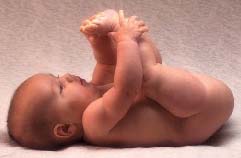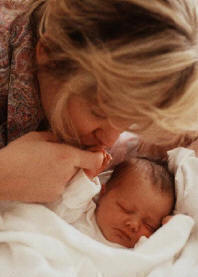|
|
|
|
Dealing with a Colicky
Infant
Colic is not some unusual disease that you should worry about. In fact, it is
actually quite common especially to babies who are barely a year old. Still, the
nonstop screaming and fidgeting can worry a lot of parents, especially if this
is the first time that they have encountered such a problem. After all nonstop
crying can be the result of many things not just a colic.
This is the reason why it is important for parents to know just what colic is
and to recognize its signs and symptoms.
There is actually no known cause of colic. Despite being quite common, medical
experts still have no idea what to make of this problem. It usually starts
during the first few weeks, particularly during the third week. It peaks at two
months of age and then subsides at the third to fourth month. By the fourth
month, there will usually be no more episodes of colic.
Colic is purportedly a painful gaseous feeling brought on my stomachache.
Children, who are unused to the problem and cannot communicate the pain, will
cry for about an hour up to as much as five hours. They will scream at the top
of their lungs. This can be really surprising for parents who are not used to
seeing their normally quiet and angelic babies in this kind of mood.
Colic often occurs in babies who are big and active, especially those who are
great eaters and those who grow really well. These babies will usually have
colic episodes at specific time of day, often after each meal.
Since there is no known cause of colic, there is also no cure. There is not much
that parents can do but make the experience as comfortable as possible for the
infant and of course to lessen the pain and make sure that it will not get
worse.
Below are some tips that will help you lessen the effects of colic and make sure
that you are helping your child and not exacerbating the situation.
First advice that parents should heed is to not overfeed the child. Sometimes,
when babies cry, parentsí first instincts is to feed them, thinking that they
are hungry. Before feeding them, make sure that they are hungry and not having a
colic.
Another thing that parents should watch out for is the foods that they take in.
This is especially true with moms who are breastfeeding. Some babies are
allergic to certain kinds of food and although you are not feeding those foods
directly to him, they will still get the allergens through the milk that you
give them.
Foods that are usually avoided are caffeine, cabbage, onions, beans, and other
foods that produce gas. Juices may also result to colic so make sure that your
juices are diluted with water or better yet, just make them drink pure water
when not drinking milk.
Intense emotions may also contribute in starting a colic episode. Parents are
then advised to avoid letting their babies see their anxiety, their fear or
their tension so as to avoid transferring the emotions to the babies.
Walking the infant can vastly help in alleviating colic. Make sure that his legs
are drawn up so that pressure is taken from his belly.
Parents can also try letting their babies listen to some soothing music and to
rock them gently, which can help relax them.
|
|
|
|
Bringing Baby Home |
|
 |
|
|
Your newborn goes
through a lot right after heís born. Whether the
birth was natural or assisted, he experiences a
great deal of stress as he copes with the abrupt
change in the world as he knows it.
The first days home with baby can be trying. If you stay calm, however, these simple tips
will ease the transition for both of you.
More |
|
|
|
 |
Baby's Naptime |
 |
If you baby is not napping well during her first few months of life, you may
want to try to cut back on the time she is awake by 15 minute increments. |
|
If she is
getting over-stimulated, then she will fight
sleep and be difficult to get to nap.
More |
|
|
|
|
Bath
Time For Baby |
|
Bath time is a special time of bonding
with a baby and her parents. |
 |
|
Itís a time to play gently, talk and
sing. Get everything you will need
ready before you start! Here's a
list of things you should have ready...
More |
|
|
 |
Breastfeeding Basics |
|
 |
Breast milk is the best food
you can give to your baby.
Once you've given birth breast feeding is the single
most important |
|
thing you can do to protect your baby
and help to promote good health. Best of all, breast
feeding is free.
Along with saving you money on HMR (Human Milk
Replacement), breast feeding can also help you to keep your medical bills down.
Babies that
are fed
with formula get sicker more often and more seriously
than babies that are breast fed They also have more
ear infections, respiratory infections, and other
problems.
More |
|
|
|
|
What Every Parent Needs To Know |
|
 |
I t
starts the day you bring your newborn
home...
Every parent
wants to make sure they provide for their
child the best they can. Every day of their
young lives. But infants don't come home
from the hospital with a manual.
Loving your
child is the easy part. |
|
Making sure you
raise them to the best of your ability is
not. When every person you turn to has an
opinion about where to put your baby's
cradle, to listen to their crying or to
ignore it...
With so much
information out there, it's important for
you as a parent to make sure you take the
time to learn how to care for a child. You
and only you can do this for yourself. But,
we can help.
"Easy Motherhood"
Click here to read
more |
|
|
|
|
|
|